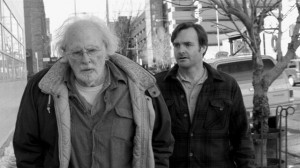Woody Grant has white hair, a cranky disposition and a stubbornness that just won’t quit. When we meet him, he’s being stopped by a highway patrolman as he’s walking down the shoulder of a Montana interstate. His son David picks him up at the police station, and it turns out Woody was on an 850-mile stroll to Nebraska, to collect the million dollars promised to him in a letter.
David points out gently that the letter is an ad for magazine subscriptions, but he’s no sooner got the older man back to his house then he gets a call from his mom: Woody has hit the road again.
As played by Bruce Dern in a performance you’ll be hearing about at awards time, Woody may be slipping mentally, but he’s still sharp in flashes. He also has a plain-spoken, scene-stealing wife (June Squibb), whom you might call a decent incentive for getting out of town.
The son you’d expect these two to produce — put-upon David, played with wary grace by Will Forte — decides a bit of bonding with a father he doesn’t really know couldn’t hurt. So they hop in his car, and soon they’re passing through the town where Woody grew up, a place where the people look as weathered as the buildings, and where David discovers, despite much backslapping, that even friends can be harsh.

9(MDAzOTIwODA0MDEyNTA4MTM1OTcyMGJmMA001))

